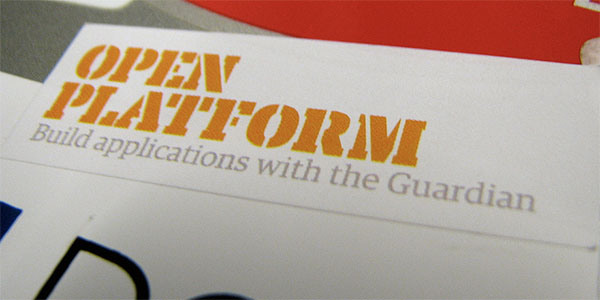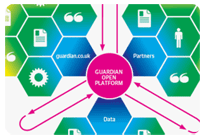
In the wake of the recently introduced New York Times Article Search API, UK newspaper and news website The Guardian has announced a competing API that allows third parties the opportunity to incorporate all material from the Guardian into their own sites for free, including over a million articles going back to 1999. In return for being able to use Guardian content in this way, third parties are expected to carry Guardian advertising, a requirement forming part of its terms of use (not yet, but in the nearby future).
The actual API the Guardian has developed consist of two components: Open Platform and DataStore [guardian.co.uk]. The Open Platform will enable users to weave Guardian material, text, audio, video, and more, in online mash-ups, even commercial. In turn, Data Store offers access to about 80 data collections, which have been put together by the paper's editors. Their topics range from what people eat, over the smoking figures for every country, international suicide rates, or the number of plastic bags imported and exported worldwide.
Each Data Store dataset seems to be stored as a Google Spreadsheet, which means developers can access it using Google's Spreadsheets Data API. (Note: for those interested in more publicly available datasets, it might be worth it to also look at the Public Datasets on Amazon Web Services).
As a side note, some reports point to the fact of The Guardian shareholder structure making this possible: "It helps that the paper is owned and run by a charitable trust which does not have shareholders who would normally have a heart attack at such a move."
Some early application examples include Zemanta's Guardian topic researcher, which searches the database of Guardian articles and then proposes links to related concepts. There is also Content Tagger, an application to provide user-generated tagging on The Guardian content; ApiMaps.org, built by Stamen Design, designed to crowdsource geodata based on Guardian articles; and Cass Sculpture Foundation, which insert lists of articles from the Guardian about its sculptors into their biography and home pages.
Even more at Wired, TechCrunch, Editors Weblog.
-----
Via Information Aesthetics
--------------------------------------------------------------------
& comments from Mashable on the same question:

The situation in the newspaper industry is not good. 10 major US newspapers, according to Time, will go out of business or go digital-only very soon. It’s time to change business models, otherwise that last train might go away and never come back.
UK’s Guardian has done exactly that, by opening up its content freely for anyone with something called the Open Platform. It’s a…
“…suite of services that make it possible for our partners to build applications with the Guardian.”
It consists of two parts: the Content API, which lets you freely retrieve data from Guardian’s vast content database (over one million articles), and the Data Store, a collection of stats and data sets curated by Guardian journalists.
In short, Guardian will let anyone use their content on their site or web service. How do they plan on making money then? Well, this bit from their announcement might give you a clue:
“The Guardian is positioning its Open Platform as a commercial venture, requiring partners to carry its advertising as part of its terms and conditions.”
Therefore, instead of trying to charge you for content that can easily be duplicated ad infinitum, Guardian will let anyone duplicate and use their content and then slap ads on top of everything. Launch partners include The Cass Sculpture Foundation, which is using Open Platform to add Guardian articles about British artists to its site, as well as Stamen and OpenStreetMap, which developed a service that makes use of users geotagging Guardian articles, positioning articles, images and videos on a map.
Will it work? It’s too early to tell, but it definitely beats going out of business, and Guardian is showing some guts by embracing new business models instead of clinging on to old, defunct ones.
While Others are Closing Down, Guardian Opens Up
Personal comment:
Grande modification de modèle en cours (en prévision) pour la presse... sous la pression des médias en lignes et leur modèle participatifs (open source, "crowdsourcé", etc.). Et ce n'est que le début!


